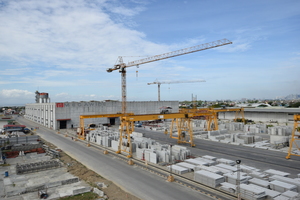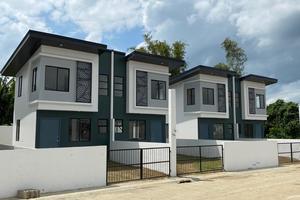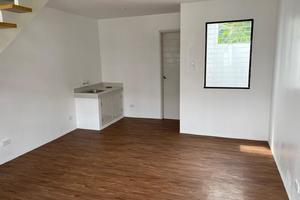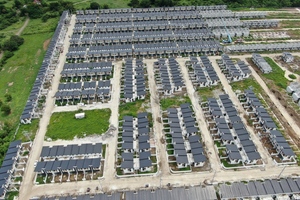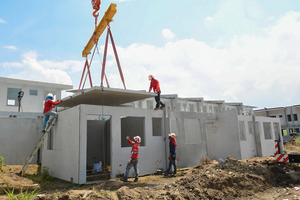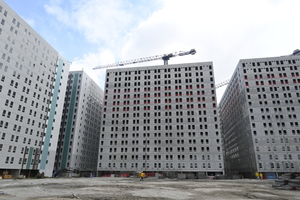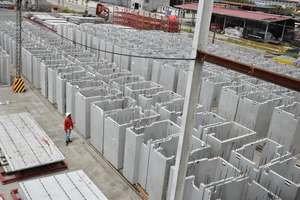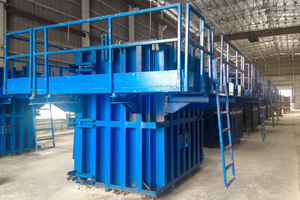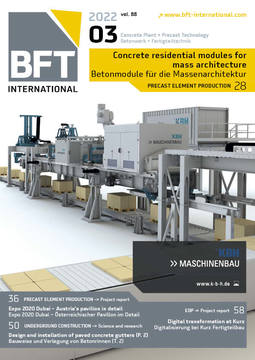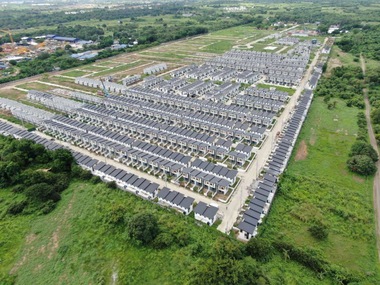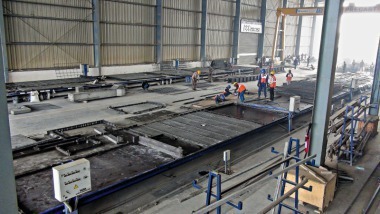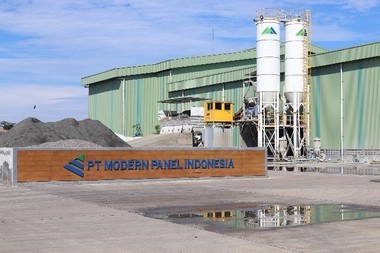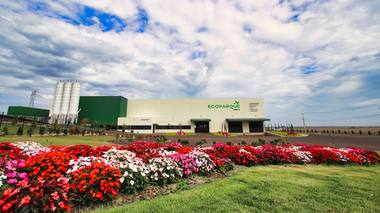Philippines precast concrete pioneer Mega-wide celebrates 10 years of innovating for the affordable housing market
The Indian Economic Times defines affordable housing as follows: Affordable housing refers to housing units that are affordable by that section of society whose income is below the median household income. Though different countries have different definitions for affordable housing, it is largely the same. Affordable housing becomes a key issue especially in developing nations where most of the population cannot buy houses at market prices.
Affordable housing becomes a key issue especially in developing nations. With this mind, we should consider an increasing importance of this issue worldwide. Housing prices are rising to an extent pay scales cannot keep up with, so more and more people will be needing affordable living space. The UN estimates that, by 2030, three billion people will need affordable housing in cities. Many developers and most of the construction industry are searching for appropriate methods to implement this in their business plans and develop good solutions to benefit the population and the companies.
Funded and supported by the government – affordable housing in the Philippines
Like the industry, many governments are conscious about the need for affordable housing and make considerable efforts to support their citizens. In the Philippines, the issue is covered by the Home Development Mutual Fund (HDMF), more popularly known as the “Pag-IBIG” government fund. The biggest backlog is for the lower-income residents and overseas workers with Filipino citizenship.
Within the five categories covered by this fund, leading Philippine infrastructure and engineering innovator Megawide Construction Corporation focuses on the two most economical ones for its projects and demonstrates how precast concrete elements are creating mutual benefits.
Building affordable houses at state-of-the art central factories and satellite precast operations
For over 10 years, Megawide has been building high- and mid-rise projects using precast elements and believes that this construction method will define the future of affordable housing.
Megawide is currently building six projects with precast elements, totaling around 12,000 units. Two additional projects comprising 6,000 units have started in 2021. For these projects, the company acts either as EPC contractor (Engineering, Procurement and Construction) or just takes on the precast producer role.
Two of the new projects will be the first for horizontal housing developments and will be delivered as turnkey. All projects currently under construction are located in the province of Luzon while one other turnkey project will soon start on Mactan Island in Cebu.
The projects in the Manila metropolitan area are served by the central factory in Taytay, Rizal. For the other projects, the precast elements are produced in on-site satellite factories, which keeps the process more cost-effective. Logistics costs are too high to deliver from centralized factories to all the locations of housing developments in the provinces.
But this does not mean that the satellite factories are any less productive. At these facilities, the machines are equipped with state-of-the art-technology, and provided, among others, by one of the biggest precast machinery developers in the world, Progress Group. Using this innovative technology, the elements can be produced with less manpower and within a shorter period of time. The precast slabs and walls, as well as the already prefabricated bathroom units, can be installed quickly on-site, thanks to the short building time made possible by this method and a committed schedule.
But still, many people in the industry are unsure if this way of building can also be profitable for the company. The answer is yes, this business can be commercially successful. More and more builders are counting on the method’s faster construction process and high-quality standardization, as well as on-time delivery to clients. This is why precast elements are preferred over other building methods many times, also keeping in mind that additional opportunities will arise post-COVID.
Fast in setting up a factory
Markus Hennig, Executive Vice President – Business Units at Megawide, states: “Our precast system, from engineering to production and installation, and our highly sophisticated engineering know-how combined with a lower cost base are the keys. One of our clients was searching for an entire year to find an alternative supplier but could not find anyone who could supply the quality for the price we offered. We are fast in setting up a factory, ramping it up quickly, and performing as per the agreed schedule to complete a sufficient number of units per month.” He adds: “Yes, with precast the costs are higher. But with a conventional method, nobody can complete as many units per month and year as we do with precast.”
Town houses in Tanza
One of Megawide’s projects with a focus on town houses is in Tanza, at Cavite, Luzon. On 28 hectares for 2,800 units, the main client’s design is 42 m² per unit. Every developer has its own design, but most of the low-cost houses are planned as town houses with a living space of 42 to 48 m². The ones with 50-65m² are single attached or duplex units with a higher selling price. Two to three units are installed per day, resulting in 60 to 70 units per month that can be completed with precast elements. The goal is to build 600 plus units per year per location with one production facility and a single installation team and crane.
Adding to the town houses built with precast elements, affordable housing projects also include infrastructures such as town halls, basketball courts, and other community areas. Sometimes even the streets are built by the developer. The main group of users of these buildings are overseas workers and, as per the funding guidelines, they can buy such a house for an amortization of 3000 PHP/month (52 euros). 1.8m Philippine pesos (31,000 euros) is the approximate selling price, which, of course, varies across different regions.
Multi-story buildings for those who work in the Manila metropolitan area
Another of Megawide’s projects is a 14-story mid-rise affordable housing project built with 90% precast – shear walls, half slabs, external and internal walls, stairs, and prefabricated bathroom units.
The pre-COVID plan was to create 23 buildings with 900 units each, all within five years of building time. Now, the schedule for completion has expanded. Still, with this big floor area, Megawide is able to construct one floor within ten days. Most of the buyers are singles or couples working in the metropolitan area of Manila who do not want to travel much to their homes in the provinces. One to two people with up to two children are going to live in the 24 m² single bedroom-only flats, with only a few bigger double condos.
The wall versions vary between shear walls and gravity walls, depending on which floor it is. The higher one gets, the thinner the walls will be. For affordable housing, the external and inner solid walls are produced in a thickness of 100 mm. The prefabricated bathroom unit (PBU) has 80 mm walls with at least two sides. Megawide is the first company in the Philippines to work with PBUs. The PBUs can be made with a special 3D mold system and installed on-site as finished bathroom units, which saves time and manpower while achieving a higher quality standard. The foundations are constructed conventionally without precast elements. The infrastructure will be planned with the developer and Megawide will deliver the turnkey portion.
COVID changed the working habits
The backlog remains the same, but COVID changed the working habits, and along with that, the demand for one’s own home and its location. The trend is said to switch from living close to the city to more likely living in provincial areas as working remotely is getting very common in all businesses. Building with precast elements made in satellite factories is flexible and thus perfectly compatible with this change of habits, without losing any time and at a much greater financial benefit than originally thought.
Building with precast elements is more costly than other methods, but it is still lucrative thanks to the greatly increased production and building speed while providing the real estate developer with a higher level of commitment and safety regarding the delivery time. It makes sure that they will not lose buyers due to a much longer completion period than anticipated.
“With precast elements, we can provide a new edge and opportunity by making available a much higher quality than conventional construction to the developers. This leads to a higher price that they can sell the units for, and of course, this creates and develops trust in the developer’s brand as they work with our well-known brand,” Hennig confirms.
CONTACT
Megawide Construction Corporation
20 N Domingo St
Quezon City
1112 Metro Manila/Philippines
Progress Group
Julius-Durst-Straße 100
39042 Brixen/Italy
T +39 0472 979-100

